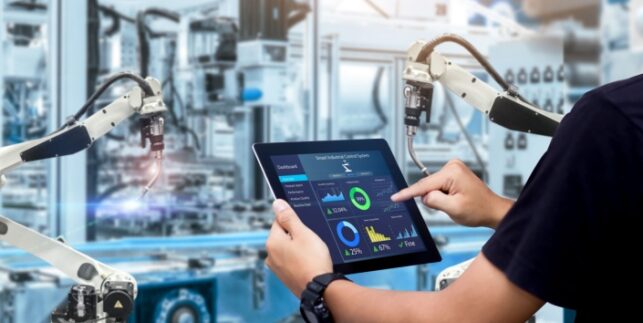
There isn’t a year that goes by without advancements and changing trends in manufacturing. The only decision that organizations have to make is whether or not to embrace these changes as they move forward. Manufacturers that take the time and effort to establish and implement the latest best practices grow and thrive, while those that do not are left behind.
In that regard, 2022 will be a year like many others. There are certain industry trends that are set to define the year, and any manufacturer would do well to pay close attention.
In order to remain competitive, manufacturing operations will need to ensure that they have the necessary tools and practices in place to keep up with these trends.
Adoption of Industry Industry 4.0 Best Practices
Industry 4.0 represents a set of ongoing developments in manufacturing and other production environments. It takes its name from the concept of the “fourth industrial revolution.” The first three saw the widespread use of steam power, electricity, and computer manufacturing in the industry, and the fourth could be just as impactful.
Today, Industry 4.0 is ushering in autonomous production, digitalization, machine learning, and other cutting-edge technologies. These are all technologies that exist today and are now undergoing the transition to mainstream use in manufacturing. Manufacturers that want to stay competitive must move quickly to implement Industry 4.0 methods and practices to avoid being left behind.
In many cases, organizations are ill-equipped to handle this kind of tradition on their own. The IoT connectivity, automation, and analytics that Industry 4.0 brings with it are a major departure from the way that many organizations are used to running their operations. These manufacturers will require an external solution that meshes with existing systems if they want to succeed.
Emphasis on Sustainability
The manufacturing trends of 2022 aren’t all purely technical. The push to implement sustainable practices in manufacturing has continued to grow, and 2022 could be a critical juncture for many manufacturers. The push to increase sustainability has been a social factor for years, but new methods and technologies are making it a viable option from cost and implementation viewpoints as well.
Manufacturers of all kinds have to contend with how to implement sustainable processes, but the plastics industry is of particular note. Plastic waste is one of the primary focal points of both the social outlook on sustainability and also legislation in that area.
Governments are moving towards taxing manufacturers rather than consumers. In the UK, legislation is already set to tax manufacturers on any packaging that is less than 30% recycled material. Similar legislation has been proposed in the US but has not yet passed. In any case, it is clear that manufacturers will need tools for reducing waste and implementing internal recycling processes.
Integration of Automation Solutions
Manufacturers have been using increasingly complex automation methods for decades. The practice is incredibly cost-effective for almost any industry and is implemented wherever possible. In 2022, manufacturers could see automation become viable across a much wider range of applications.
In some industries, we’re already starting to see the rise of the “smart factory.” This refers to operations that don’t require any human intervention. As outlandish as this sounds, manufacturers should consider what a 19th-century factory worker would have to say about PLCs and MESs. Automation has already made leaps and bounds, and in some industries, it appears to be only a few steps from the finish line.
In the near future, most industries are unlikely to see anything beyond a gradual reduction in the number of operators per shift. There will still be the need for direct oversight of production, along with technicians, maintenance, and other production team members.
Complete shop-floor Digitalization
Improvements in connectivity, available data, and analytical capabilities are making the digitalization of the factory floor a major trend for 2022. Digitalization is the merging of conventional processes with digital control and monitoring. It sees more use of software solutions to provide better oversight, along with connectivity to bring every part of the process under centralized control.
While those who have spent many years within a manufacturing environment might not realize it, even MES and ERP systems rely heavily on operators to understand and seek out context. Data is being collected from the factory floor, but it isn’t being properly utilized. The latest solutions go far beyond simple data aggregation and provide meaningful context for that data.
Overall, this allows for manufacturing operations to increase efficiency and reduce costs. Problems are identified more quickly, long-term trends can be analyzed, and managers, operators, maintenance, and everyone else involved in the manufacturing process can have straightforward access to the data they need to make accurate, informed, and timely decisions.

Changing the way people work in factories
Request a Demo
Taking Advantage of Everything 2022 Has to Offer With Matics
Matics provides a real-time operational intelligence solution that gives manufacturers the tools they need to compete in the modern manufacturing landscape. Real-time operational intelligence is a solution that provides a single source of truth for manufacturers, bringing together data from machines, MES and ERP systems, and human experts within the manufacturing environment.
Our solution doesn’t just aggregate this data but uses it to provide effective and accessible insight and overview for manufacturing processes. Managers, operators, and more can quickly access real-time process information, along with data from previous shifts for comparison and to investigate problems. Matics tracks KPIs and can provide alerts when your process is outside acceptable thresholds.
The Matics solution could be a major step in your operation’s transition to a digital factory. Your competitors are likely already implementing their own Industry 4.0 practices, and 2022 could be a critical year for any manufacturing environment.
Contact our team today to book a demo and find out what Matics has to offer.




